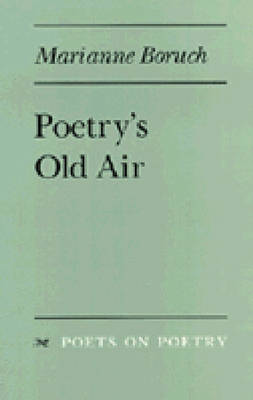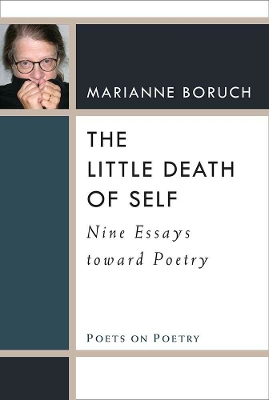Poets on Poetry
2 total works
Marianne Boruch is one of America's finest contemporary poets, and as she demonstrates in Poetry's Old Air , she is also a marvelous essayist. Weaving together close readings, biographical detail, and personal reflections, Boruch meditates on a universal fascination: how a poem comes to exist. A variety of imaginative approaches sets the essays apart from strictly academic poetry criticism. Boruch's ear for metaphor and attention to everyday experience enrich her readings of others' work. The unique connections she draws to the world beyond the literary one- including comparisons to painting and ceramics, the habits of bees, and the basic elements of musical composition- bring other ways of seeing and thinking to bear on the writing process itself. Instead of building her arguments and observations around a single thesis, Boruch borrows freely from other areas of human knowledge and experience, allowing essays to develop gradually and ""waywardly,"" as a poem is made. Poets, teachers of literature, and students of writing and literature, as well as the general reader, will appreciate the insights of Poetry's Old Air , as will the general reader, for whom these essays are entirely accessible. Marianne Boruch is the author of three acclaimed volumes of poetry: Moss Burning, Descendant, and View from the Gazebo . She is Associate Professor of English, Purdue University.
The line between poetry (the delicate, surprising not-quite) and the essay (the emphatic what-about and so-there!) is thin, easily crossed. Both the poem and the essay work beyond a human sense of time. Both welcome a deep mulling-over, endlessly mixing image and idea and running with scissors; certainly each distrusts the notion of premise or formulaic progression. The essays in The Little Death of Self emerged by way of an odd detail or bothersome question that would not quit- Why does the self grow smaller as the poem grows enormous, or as quiet as a half-second of genuine discovery? Why does closure in a poem so often mean keep going, so what if the world is ending! Must we stalk the poem or does the poem stalk us until the world clicks open?
Boruch's intrepid curiosity led her to explore fields of expertise about which she knew little; then, perhaps through her reading, observation, and conversations with thoughtful people, she knew enough to be forgiven for delving into areas such as aviation, music, anatomy, history, medicine, photography, fiction, neuroscience, physics, anthropology, painting, and drawing. There's an addiction to metaphor here, an affection for image, sudden turns of thinking, and the great subjects of poetry: love, death, time, knowledge. There's amazement at the dumb luck of staying long enough in an inkling to make it a thought or a poem at all. Poets such as Keats, Stevens, Frost, Plath, Auden, and Bishop, along with painters, inventors, doctors, scientists, composers, musicians, neighbors, friends, and family-all traffic blatantly or under the surface-and one gets a glimpse of such fellow travelers now and then.
The essays collected in The Little Death of Self are meditations toward poetry by a poet who finds this mysterious genre the weirdest, most compelling of all human ways to imagine-or fathom-the great world.
Boruch's intrepid curiosity led her to explore fields of expertise about which she knew little; then, perhaps through her reading, observation, and conversations with thoughtful people, she knew enough to be forgiven for delving into areas such as aviation, music, anatomy, history, medicine, photography, fiction, neuroscience, physics, anthropology, painting, and drawing. There's an addiction to metaphor here, an affection for image, sudden turns of thinking, and the great subjects of poetry: love, death, time, knowledge. There's amazement at the dumb luck of staying long enough in an inkling to make it a thought or a poem at all. Poets such as Keats, Stevens, Frost, Plath, Auden, and Bishop, along with painters, inventors, doctors, scientists, composers, musicians, neighbors, friends, and family-all traffic blatantly or under the surface-and one gets a glimpse of such fellow travelers now and then.
The essays collected in The Little Death of Self are meditations toward poetry by a poet who finds this mysterious genre the weirdest, most compelling of all human ways to imagine-or fathom-the great world.

